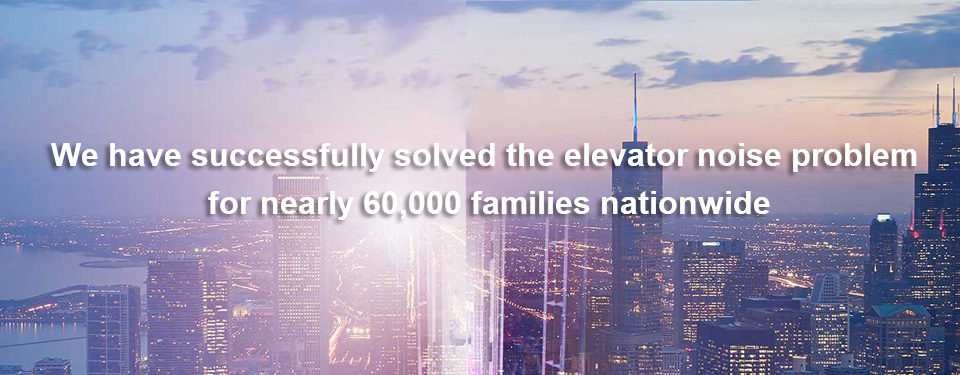
Chapter 6 what materials and brands are used for elevator noise control?
——Welcome to visit the column "elevator noise prevention and control I am an expert - ask if you don't understand". This article is the sixth chapter after the column is opened.
The topics answered in this chapter come from the questions raised by the owners of Beijing, Shanghai, Guangzhou, Chengdu and other cities:
Owner's questions answered in this issue
1. I can't stand the noise of my elevator. I want to spend money to control the noise of the elevator. What materials should I buy? (glass wool? Sound insulation board? Sound insulation felt? Muffler?) What brand do you use?
2. The elevator in my home is very noisy. We found a professional noise reduction unit to absorb the noise in the machine room, but the noise reduction effect is not ideal. Why?
3. The property management and elevator company have not allowed the elevator to move, but the noise of the elevator is really too loud. I think I can solve the problem of elevator noise by spending money to build a sound insulation wall at home?
4. I also know that the elevator noise is low-frequency vibration, but the cost of installing the elevator to reduce vibration is too large, and the property and real estate companies are unwilling to bear it, so I want to build a sound insulation wall indoors, will it have obvious noise reduction effect?
Technical answers
(1) What material does elevator noise control use? What brand should I choose?
Mr. elevator's reply:
According to the technical application and test results of elevator noise reduction practice cases over the years, the glass wool, sound insulation board, sound insulation felt or muffler described by the residents are not effective materials to reduce elevator noise, and the single application of such noise reduction materials or the combination of multiple materials has no obvious effect on the reduction of elevator noise.

In the application of noise reduction, we always think of the application of sound insulation cotton, sound insulation board, muffler and other materials and structures at the first time, but also often go into a misunderstanding. Here, I need to point out to you that it is a wrong technical application to control elevator noise with sound absorption and sound insulation materials.
Sound absorption ≠ sound insulation



Wrong site photo of sound absorption in elevator machine room
Sound insulation ≠ vibration isolation


Wrong site photos of sound insulation in elevator machine room
Elevator noise is mainly due to the vibration of the equipment during high-speed operation through the rigid structure of the wall, resulting in the sound transmission of the building structure solid. The installation of sound-absorbing materials only absorbs the air sound energy in the machine room or shaft, and the installation of sound insulation materials only increases the sound insulation of the wall, but this can not effectively block the transmission of elevator vibration to the building wall (the vibration will still be transmitted to the wall through the elevator shelving beam to form solid sound transmission). Therefore, the application of sound absorption and sound insulation measures in the field of elevator noise reduction is a common wrong technical choice.
Vibration is a kind of physical energy transfer. Only when the energy is absorbed or released effectively, the low-frequency vibration noise will be eliminated or effectively reduced. Therefore, vibration reduction is the only correct direction of noise reduction. The sound insulation cotton, sound insulation board, sound insulation felt and muffler mentioned above are not the materials to solve the elevator noise.
Technical answers
(2) Why there is no noise reduction effect when the elevator room is equipped with wall sound absorption?
Mr. elevator's reply:
As for the application of sound absorption measures for the wall of elevator machine room, no matter how good the sound absorption cotton and what brand of sound absorption board you use, the only function it can play is to absorb the noise reflected air sound energy in some machine rooms (only effective for the air sound in the machine room). According to the field test data of practical engineering cases, different wall sound absorption technologies in the machine room can generally reduce the indoor noise in the elevator machine room by 7-13 decibels. After noise reduction treatment, when people are in the elevator machine room, they can feel that the noise in the machine room is significantly reduced. However, what we need is to reduce the elevator noise in the house, not in the elevator room. These are two different noise reduction objectives:

From the above two points, we can clearly see that the elevator noise in the elevator machine room does not really affect the elevator noise in the owner's room. Because the low-frequency vibration of the elevator is transmitted to the wall structure through the elevator joist, the vibration and noise in the house will not be reduced due to the reduction of the air transmission in the elevator room. This is the real reason that the owners often reflect that "although the elevator room has taken noise reduction measures, but the residents can not feel any noise reduction effect" and it is also a common wrong technology application in the development of our domestic real estate.
Application Atlas of common error technology in elevator noise reduction
Acoustic enclosure (error)

Sound insulation of machine room (error)

Sound absorption and opening of machine room (error)

Add sound absorber in machine room (error)
In fact, the wrong understanding of elevator vibration and noise is the impact of air borne sound, and there are many ways to install sound insulation walls in the elevator machine room or to absorb the sound in the elevator machine room, which is also the biggest technical error of elevator noise reduction in China. From the owners, property management, design institutes, real estate companies or the standard atlas of the Ministry of housing and urban rural development of the people's Republic of China, we can see a large number of such erroneous technology applications of "vibration control as sound absorption or sound insulation treatment". The final result is often that a lot of money is spent on noise reduction measures, but the final effect of noise reduction is not obvious.
Generally speaking, elevator noise has risen to the regulatory level that the state attaches great importance to. However, from the design unit to the construction unit, from the local government to the national standard management level, there is still a lack of technical awareness of elevator noise reduction, which leads to the current situation of elevator noise reduction prevention and control confusion:
There are standards and requirements for elevator noise reduction in architectural design and standard atlas of elevator noise reduction in architectural construction. However, when the final noise reduction measures are implemented, there is no in-depth analysis on the principle and noise source of elevator noise, but the construction is simple or taken for granted according to the drawings. Therefore, the noise reduction measures of electric elevator often have no effect, and there are still a lot of complaints after the residents move in.

Based on the above two replies, it is suggested that the residents should first seek professional personnel for on-site analysis when encountering elevator noise to determine the sound source of elevator noise (to determine whether the indoor elevator noise is machine room noise or guide rail noise, whether it is vibration solid sound transmission or wall bad sound transmission), and then according to the on-site analysis, remedy the problem and select the corresponding effective measures for rectification. Only in this way can we avoid "going to the doctor in disorder" and spend a lot of time, energy and money, but not really solve the problem of elevator noise.
Expert opinion of Mr. elevator

Column introduction
I am an expert in elevator noise prevention
Mr. elevator, the enlightener of China's elevator noise reduction industry, has been promoting the application of elevator noise prevention and control technology nationwide since 2005. He has provided free consultation and technical answers to the users who are bothered by elevator noise through blogs, QQ, forums, etc. For more than ten years, we have been sticking to our original dream: "to eliminate elevator noise and save people's quiet life!" So far, Mr. elevator and his team have served more than 100000 users.
In order to let more customers get timely answers when encountering difficulties in elevator noise control, Mr. elevator has since March 2019 set up a column in WeChat public, "elevator noise prevention, I am an expert - I don't understand you." Customers are welcome to raise your questions through the WeChat public number "elevator noise control", elevator signal or dianti-sir (0755-86379063).
In addition, we will regularly select some representative "elevator noise questions" to give public answers, so that more customers suffering from elevator noise can find the right answers!
"Mr. elevator" claims: "when encountering elevator noise, ask if you don't understand. Welcome to ask!"


































